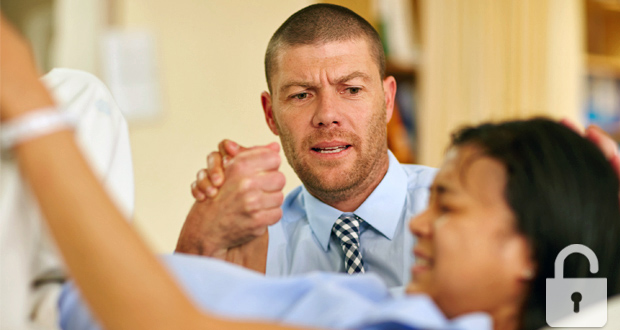Male partners are not always included at all phases of the process. They are sometimes treated like a support person instead of a father-to-be. Often there is an assumption that men aren’t informed and therefore can’t be part of the discussion and therefore excluded."
Men are being ignored and dismissed in birthing suites – but is their behaviour ever to blame?
An anonymous survey of midwifery students from Edith Cowan University (ECU) revealed they believe men are often treated negatively in birthing suites.
Nine in 10 midwifery students on placement said they witnessed male partners being ignored, treated condescendingly and sometimes not given information before and during adverse events or emergencies.
Researcher and midwife Christian Wright said doctors and midwives were observed introducing themselves to and addressing women only, not explaining common procedures to men and asking them to leave during events.
One participant saw no problem with male partners being ignored. "I don’t think doctors ignoring male partners is a negative thing," the student said. "It isn’t about them – is it?”
Wright said: “Participants stated they observed male partners being talked down to, receiving negative comments for yawning or relaxing on the couch and being treated as annoyances."
But is some of this fair and reasonable behaviour on the part of the midwife or doctor?
Participants called out men for adopting a ‘disinterested bystander position’. They said male partners were often preoccupied with smartphones, the TV in the labour ward and iPads during the birthing process.
One student said she saw men sleep through most of their partner’s labour and bring in take-away to eat in front of the woman, knowing she can’t eat.
Students also reported that men were ‘attention grabbing’ or engaging in ‘overbearing support’, including trying to make decisions on behalf of their partners.
As one participant put it:
I’ve seen male partners try to influence a woman against what the midwife is recommending. I’ve seen a partner telling the midwife to get his partner an epidural, despite the woman saying she didn’t want one. He wanted her to have one because he couldn’t cope. He didn’t seem to be bothered about what she wanted."
Millennial ripples turning tides
Midwifery students held different views of male participation than many experienced midwives, Wright said. Most referred to what they do as ‘family-centred care’ as opposed to ‘woman only-centred care’.
This term was offered unprompted, and Wright said it shows that this new generation of midwives sees something in that idea.
He added midwives are seeking to be more inclusive of who the family is, as determined by the woman.
“I know of hospitals that are looking at their guidelines so that they’re not limiting the people in the room, so if someone’s support includes more than two people, then hopefully they can facilitate that.”
Write said he hopes the research will motivate midwives to continue efforts to focus on the supports and partners of women as key.
“This study only focused on male partners but there are many other partners a woman can have,” he said. “Hopefully this has identified that we need to continue to examine how we’re including partners.”
Do you have an idea for a story?Email [email protected]
 Nursing Review The latest in heathcare news for nurses
Nursing Review The latest in heathcare news for nurses

